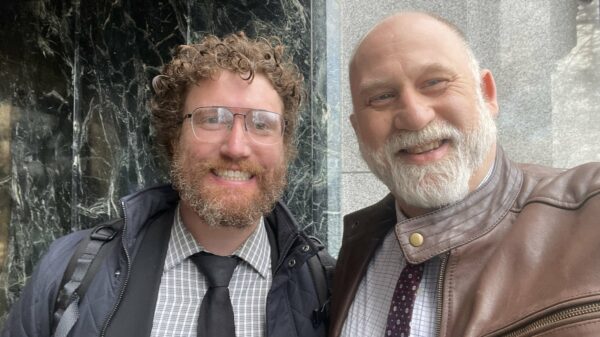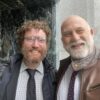Ayahuasca ceremonies can contribute to peacebuilding efforts among chronically divided societies, new research suggests, as the dust settles after a month of deadly conflict in the West Bank and Israel.
After drinking the psychedelic plant brew together, Jewish-Israeli and Arab-Palestinian participants reported moments of deep connection, unity and oneness with one another, according to a study from researchers at Imperial College London published in the journal Frontiers of Pharmacology. Results also show that music played a strong supporting role in establishing cross-culture empathy.
While psychedelics aren’t a solution to sociopolitical conflicts themselves, they’re a potential tool that could help, study author and psychedelics researcher Leor Roseman told Imperial College’s internal news publication.
“They can create a strong group bonding, and they can help groups address conflicting political issues through new insights and revelations which can occur with psychedelics,” he says.
Roseman worked alongside Palestinian peace activist and co-author Antwan Saca to see what happens when Israelis and Palestinians take ayahuasca together. The DMT-containing brew is known to produce psychedelic, mystical and profound visionary experiences.
Researchers observed three kinds of interpersonal events, or so-called relational themes, that emerged during the ceremonies.
The most common theme was “unity-based connection” where participants felt a strong attachment to each other and were able to dissolve or separate their human identity from their religious or political beliefs.
A second theme observed was “recognition and difference-based connection” where the sharing of prayers, music and cultural background created a strong feeling of connection based on a sense of shared humanity.
The last and least-common relational theme was “conflict-related revelation” where participants had visions revisiting personal traumatic events related to the socio-political conflict. “Unlike unity-based connection which was related to ‘core-humanity’ and universality of identities, these revelations emphasize the history and local identities related to the conflict,” reads the research.
For the study, researchers recruited 31 experienced ayahuasca users from Jewish-Israeli and Arab-Palestinian backgrounds and conducted in-depth interviews of their Ayahuasca ceremonies together. Ceremonies involved an average of 20 participants each and were around 4–8 hours long.

A young banisteriopsis caapi, or ‘soul vine’, one of the main ingredients in ayahuasca. Photo by Wowbobwow12 via Wikimedia Commons
The results describe how most of the shared psychedelic events were moments where participants connect to elements of shared culture and history.
“I now enjoy doing [the ceremonies] with Palestinians and Israelis because when the journey starts, everything just goes into a state of unity, to the energy that exists between us,” said a participant described as an Arab-Palestinian man from the West Bank.
“We stop viewing each other as you’re Israeli, or you are Palestinian. We stop viewing each other as male or female. We don’t view Muslim, Christian, it all melts, like melts down, and dissolves through the journey.”
Read more: 67% of PTSD sufferers drop diagnosis in first MDMA Phase 3 trial
Read more: Psilocybin gives you good ideas, but not when you’re high
Conflict-related revelations were rarer than other themes but they could be transformative when they occur, according to author Roseman.
“For example, on one occasion, a group of Palestinians cried from grief in the ceremony and that affected an Israeli,” he says.
“It triggered for him a ‘vision’ in which he saw himself doing a house arrest as a soldier, and then he saw this whole event again from the side of the family and empathized with their pain and loss.”
Read more: Nature amplifies therapeutic effects of psychedelics: study
Read more: Psilocybin therapy 4 times more effective than antidepressants: study
Language and music: hidden therapists in a psychedelic experience
A main difference between these and other ayahuasca ceremonies was that participants were able to share their identities and background during their trips through a mix of intercultural music and prayers.
“The ceremony became a space in which intercultural and interfaith exchange occurred, and this was intensified by ayahuasca,” reads the study.
Some Israeli participants described how listening to Arabic music for the first time in the psychedelic-assisted group ceremonies created a sense of openness and peace.
Although the connection wasn’t immediate, going through the emerging emotional resistance, fear and anger was essential to reach a sense of connection and oneness among participants, Roseman says.
“Suddenly you hear the language you most hated, maybe the only language you really hated, and suddenly it is sending you into love and light, and that’s the way it always is,” said a participant described as a Jewish-Israeli man.
“Whatever the song, whatever the words, you melt — that’s it that’s our peace, to sit and listen to a song in Arabic, that’s peace,” the interviewee said.
Future research should focus on examining groups who intentionally meet for peacebuilding and dialogue as well as having a more balanced mix of Palestinians and Jewish Israelis, the researchers note, given that Palestinian attendance was no more than 20 per cent at the ceremonies.
Earlier this month, conflict between Palestine and Israel erupted after Israeli police raided the Al-Aqsa mosque in Jerusalem during the Muslim holy month of Ramadan. The raid followed rising tensions over Israel’s attempt to evict Palestinian families in the neighborhood of Sheikh Jarrah in Israeli-annexed East Jerusalem.
finally this is out; and quite timely. "Relational Processes in Ayahuasca Groups of Palestinians and Israelis"https://t.co/NuGJ9FsCaH
— Leor Roseman (@LeorRoseman) May 19, 2021
Follow Natalia Buendia Calvillo on Twitter
natalia@mugglehead.com














